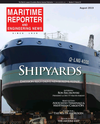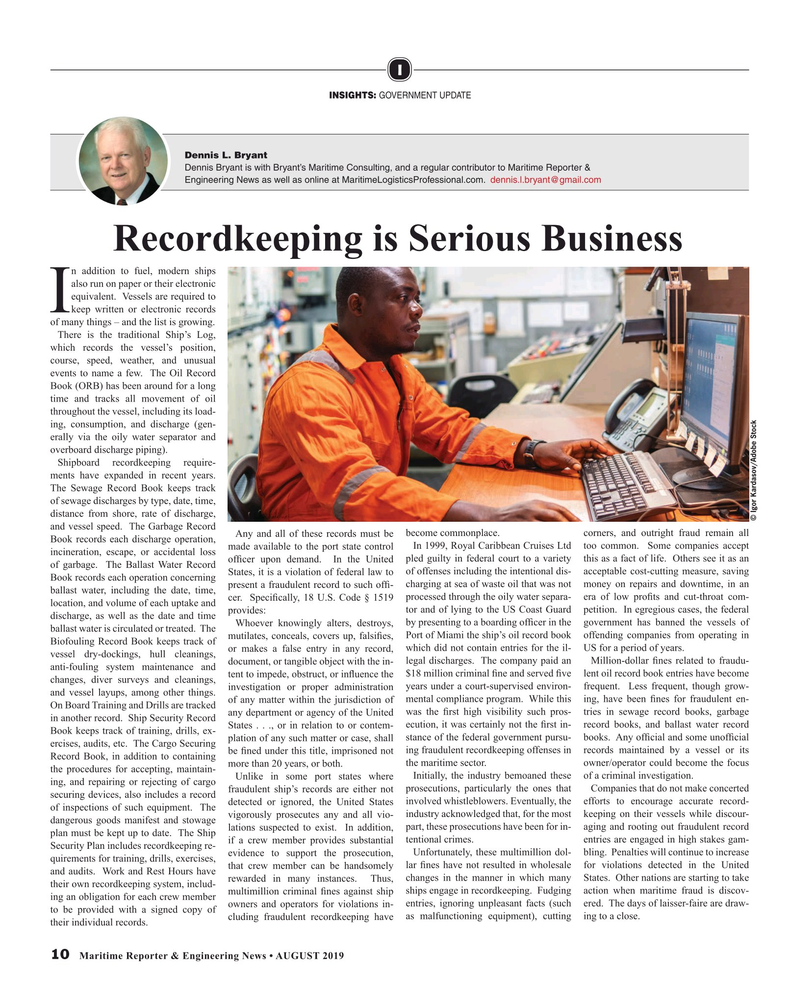
Page 10: of Maritime Reporter Magazine (August 2019)
The Shipyard Edition
Read this page in Pdf, Flash or Html5 edition of August 2019 Maritime Reporter Magazine
I
INSIGHTS: GOVERNMENT UPDATE
Dennis L. Bryant
Dennis Bryant is with Bryant’s Maritime Consulting, and a regular contributor to Maritime Reporter &
Engineering News as well as online at MaritimeLogisticsProfessional.com. [email protected]
Recordkeeping is Serious Business n addition to fuel, modern ships also run on paper or their electronic equivalent. Vessels are required to
Ikeep written or electronic records of many things – and the list is growing.
There is the traditional Ship’s Log, which records the vessel’s position, course, speed, weather, and unusual events to name a few. The Oil Record
Book (ORB) has been around for a long time and tracks all movement of oil throughout the vessel, including its load- ing, consumption, and discharge (gen- erally via the oily water separator and overboard discharge piping).
Shipboard recordkeeping require- ments have expanded in recent years.
The Sewage Record Book keeps track of sewage discharges by type, date, time, distance from shore, rate of discharge, © Igor Kardasov/Adobe Stock and vessel speed. The Garbage Record
Any and all of these records must be become commonplace. corners, and outright fraud remain all
Book records each discharge operation, incineration, escape, or accidental loss made available to the port state control In 1999, Royal Caribbean Cruises Ltd too common. Some companies accept of garbage. The Ballast Water Record of? cer upon demand. In the United pled guilty in federal court to a variety this as a fact of life. Others see it as an
States, it is a violation of federal law to of offenses including the intentional dis- acceptable cost-cutting measure, saving
Book records each operation concerning ballast water, including the date, time, present a fraudulent record to such of? - charging at sea of waste oil that was not money on repairs and downtime, in an cer. Speci? cally, 18 U.S. Code § 1519 processed through the oily water separa- era of low pro? ts and cut-throat com- location, and volume of each uptake and discharge, as well as the date and time provides: tor and of lying to the US Coast Guard petition. In egregious cases, the federal
Whoever knowingly alters, destroys, by presenting to a boarding of? cer in the government has banned the vessels of ballast water is circulated or treated. The mutilates, conceals, covers up, falsi? es, Port of Miami the ship’s oil record book offending companies from operating in
Biofouling Record Book keeps track of vessel dry-dockings, hull cleanings, or makes a false entry in any record, which did not contain entries for the il- US for a period of years.
anti-fouling system maintenance and document, or tangible object with the in- legal discharges. The company paid an Million-dollar ? nes related to fraudu- changes, diver surveys and cleanings, tent to impede, obstruct, or in? uence the $18 million criminal ? ne and served ? ve lent oil record book entries have become and vessel layups, among other things. investigation or proper administration years under a court-supervised environ- frequent. Less frequent, though grow- of any matter within the jurisdiction of mental compliance program. While this ing, have been ? nes for fraudulent en-
On Board Training and Drills are tracked any department or agency of the United was the ? rst high visibility such pros- tries in sewage record books, garbage in another record. Ship Security Record
States . . ., or in relation to or contem- ecution, it was certainly not the ? rst in- record books, and ballast water record
Book keeps track of training, drills, ex- plation of any such matter or case, shall stance of the federal government pursu- books. Any of? cial and some unof? cial ercises, audits, etc. The Cargo Securing
Record Book, in addition to containing be ? ned under this title, imprisoned not ing fraudulent recordkeeping offenses in records maintained by a vessel or its more than 20 years, or both. the maritime sector. owner/operator could become the focus the procedures for accepting, maintain-
Unlike in some port states where Initially, the industry bemoaned these of a criminal investigation.
ing, and repairing or rejecting of cargo fraudulent ship’s records are either not prosecutions, particularly the ones that Companies that do not make concerted securing devices, also includes a record of inspections of such equipment. The detected or ignored, the United States involved whistleblowers. Eventually, the efforts to encourage accurate record- dangerous goods manifest and stowage vigorously prosecutes any and all vio- industry acknowledged that, for the most keeping on their vessels while discour- lations suspected to exist. In addition, part, these prosecutions have been for in- aging and rooting out fraudulent record plan must be kept up to date. The Ship if a crew member provides substantial tentional crimes. entries are engaged in high stakes gam-
Security Plan includes recordkeeping re- evidence to support the prosecution, Unfortunately, these multimillion dol- bling. Penalties will continue to increase quirements for training, drills, exercises, that crew member can be handsomely lar ? nes have not resulted in wholesale for violations detected in the United and audits. Work and Rest Hours have rewarded in many instances. Thus, changes in the manner in which many States. Other nations are starting to take their own recordkeeping system, includ- multimillion criminal ? nes against ship ships engage in recordkeeping. Fudging action when maritime fraud is discov- ing an obligation for each crew member to be provided with a signed copy of owners and operators for violations in- entries, ignoring unpleasant facts (such ered. The days of laisser-faire are draw- cluding fraudulent recordkeeping have as malfunctioning equipment), cutting ing to a close.
their individual records.
10 Maritime Reporter & Engineering News • AUGUST 2019
MR #8 (10-17).indd 10 8/7/2019 9:09:11 AM

 9
9

 11
11
